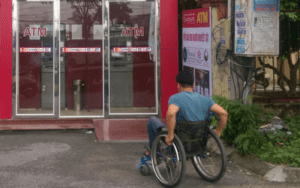Employment and Rights for People with Disabilities in Vietnam
 Union Aid Abroad – APHEDA has been working with people with disabilities in two of Vietnam’s Northern provinces, Hai Duong and Quang Nam, supporting efforts to reduce unemployment and increase social integration within the community. Beginning in 2012 with funding from the Irish and Australian governments and donations from Australian Unions and members of APHEDA, the project has built the capacity of the Vietnam Federation of Disability to deliver high quality vocational training to people with disabilities, to strengthen representation in decisions that affect employment, and to secure local government funding to continue their work into the future independently of donors.
Union Aid Abroad – APHEDA has been working with people with disabilities in two of Vietnam’s Northern provinces, Hai Duong and Quang Nam, supporting efforts to reduce unemployment and increase social integration within the community. Beginning in 2012 with funding from the Irish and Australian governments and donations from Australian Unions and members of APHEDA, the project has built the capacity of the Vietnam Federation of Disability to deliver high quality vocational training to people with disabilities, to strengthen representation in decisions that affect employment, and to secure local government funding to continue their work into the future independently of donors.
APHEDA’s project officer, Vinh Nguyen, reported that, thanks to these strategies, organisations working with people with disabilities can make their own proposals for funding; not just following what a donor wants them to do but to do what they themselves really want to do. A practical example of the types of changes the groups are making that are not necessarily priorities for donors is a successful advocacy project that led to banks lowering the height of automatic teller machines to allow people with disabilities easier access to their wages and savings, without assistance.
Union Aid Abroad – APHEDA supported the development and delivery of high quality vocational education training (VET) services targeting people with disabilities through local VET providers. Since starting in 2012, the project supported the implementation of 56 VET courses. Of the 751 people with disabilities (463 women and 288 men) completing VET courses, 616 (82%) found employment within three months of graduation – in local small businesses or within small production groups established by the workers themselves.
“…the total cost supported to each trainee is lower than the other training programs, but the results are better, here, the project has not focused on the quantity, it focused on the quality with careful capacity and need assessment, practical training and coaching supports, nearly 100% of the trainees completed the courses …..”, said a representative of the Department of Labour, Invalids and Social Affairs (DoLISA) about the project.
The project has also supported access to employment for the future for people with disabilities through research into occupational health and safety and barriers to employment and using this to raise awareness and build the capacity of local authorities and local employers.